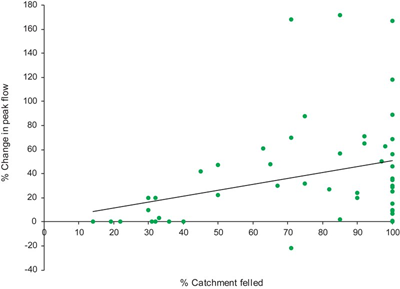
How could you be happier, healthier, wealthier and above all greener? I spend a lot of time thinking about a better relationship with material things - so here are my top lifestyle tips for 2023... 🧵 #Resolutions 

1. Get a hot water bottle. Instantly turn any slightly chilly situation into a cozy delicious one. I'm always amazed to find how many people think they're historic artefacts. 

2. Turn some of your lawn into a flower bed/ vegetable patch. Too many benefits of this to yourself and nature to fit in a tweet. 

3. Drink more water instead of alcohol. A square metre of land produces about 9 pints of beer a year. So if you drink 5 pints a week (the recommended limit) you're keeping 30m2 land in intensive cultivation just for drinking. 

4. Eat less sugar. If you eat a slice of cake each day, you're sat on about 7 square metres of land just to grow your sugar beet. Ditching redundant calories makes space for nature. 

5. Set a step count target. It will give you a reason to either walk short journeys, or park a few km short of your destination, before the bit where you end up sat in traffic. 

6. Don't pay for cloud storage. Storing 100 gigabytes of data in the cloud (the smallest paid-for Google package) has an annual carbon footprint of about 0.2 tons of CO2. Jusy clear your files out! 

7. Learn to use buses. Pretend you're making a documentary about an adventure by bus and tell the story on social media. Buses are brilliant. 

8. Shower less. Our grandmothers washed most days in a basin with a flannel and for most bodies, on most exercise regimes, on most days, it's perfectly adequate. Less hot water, less damp in the house, and less wet smelly towel in the laundry. 

9. Eat less meat. Not no meat. Meat is important in sustainable agriculture, but not in the quantities we produce it. Meat's good for you, but not in the quantities we eat it. Be obsessively moderate! 

10. Cook with the microwave. Other forms of cooking involve over-heating a room you're not going to sit in. 

11. Go to more shows. Supporting the arts is a low-carbon form of economic growth. You can leave your heating switched off at home for a start. 

12. Don't get a(nother) pet. A dog's carbon emissions just from food are around 1.5t CO2/year - equivalent to six return flights to Rome. Dogs and cats also have significant ecological impacts. Make friends with a neighbouring cat or dog instead. 

13. Continuing the theme of support for the arts, read more books. If you're saving on heating you can do it in bed. With your hot water bottle. Or write one instead? 

14. Join a dance or music class. All round good for you, make friends, and another night of the week you don't need to heat your house. 

15. Eat less cheese. It's lovely but you really don't need that much saturated fat. And 100g of cheese requires a litre of milk. Buy a smaller amount from producers driving sustainable practices, and savour it. 

16. Eat more fruit and veg. They're really good for you and low impact for the planet. If you can support a producer that is driving ecological horticulture practices so much the better. 

17. Buy less stuff. It sounds obvious. It's hard. Each time you buy something think, do I need it? Could I borrow/rent it? Could I get it second hand? But most of all - could I fill this gap in my life another way? 

18. Buy stuff that was grown not extracted. Viscose clothes, for example, are made from tree thinnings; polyester ones are made of oil leftovers. Find out about your stuff, and make the best choice you can to drive regenerative practices. 

19. Resist the marketing. A "green" product you didn't need isn't green. If you need a thing, do your best to choose the greenest option. If you don't need it, don't let anyone tell you that having it will do the planet any good. 

20. Think circular. Think about every prop in the drama of your life - food, water, energy, materials. Where did it come from? Where is it going? The only "easy" choice is use less. For what you do use, it's massively complex and we're all learning together how to do this better. 

21. Go public. Much of this involves going against the grain of our society in many ways, so support community/ local/ national/ International initiatives to make all this easier. Whether through your work, politics, business, or being a cultural leader, it's all needed. 

Every tiny thing we do to make the world a better place, makes the world a better place. Wishing you a force for good in 2023. 

@threadreaderapp unroll
• • •
Missing some Tweet in this thread? You can try to
force a refresh












